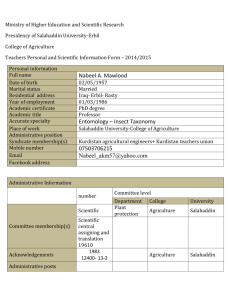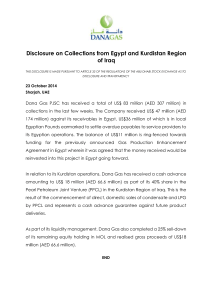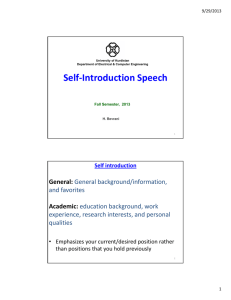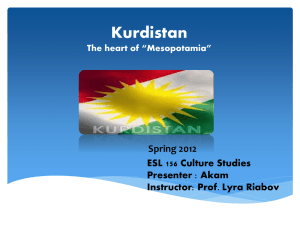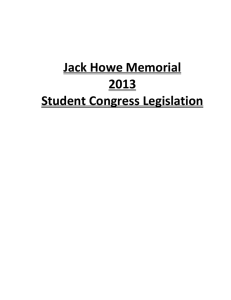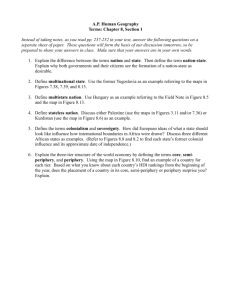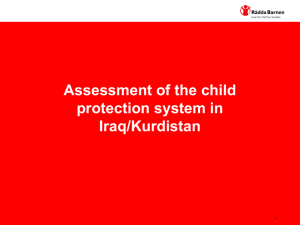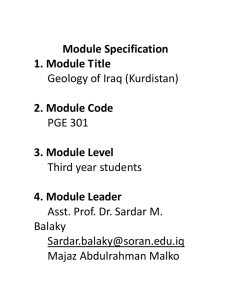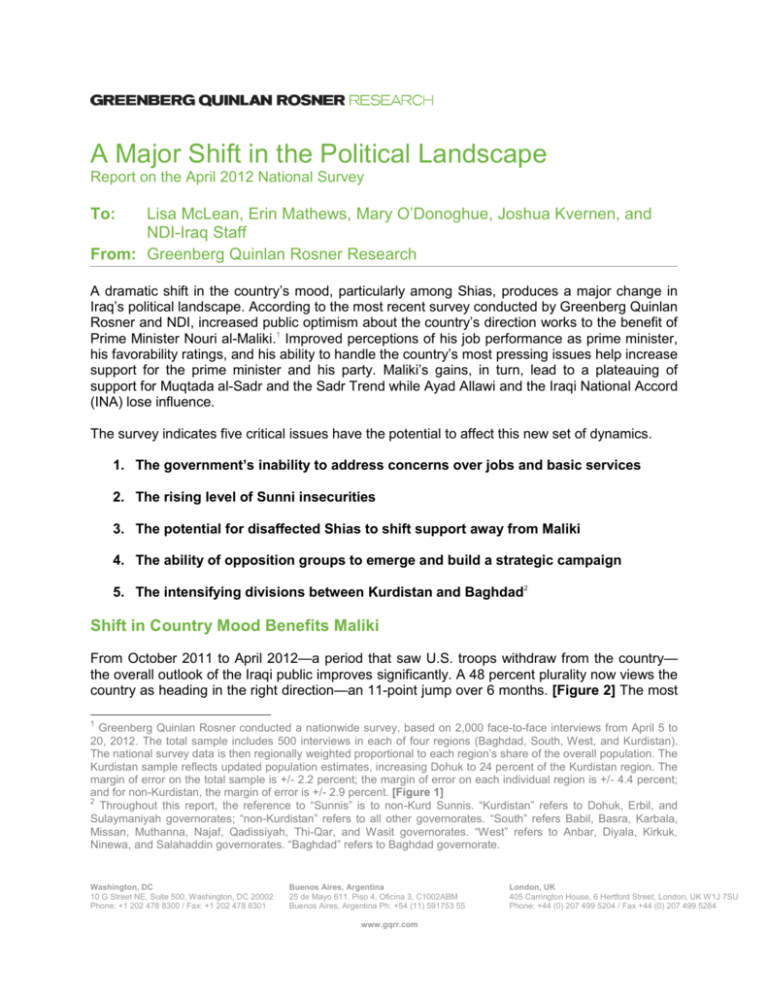
A Major Shift in the Political Landscape
Report on the April 2012 National Survey
Lisa McLean, Erin Mathews, Mary O’Donoghue, Joshua Kvernen, and
NDI-Iraq Staff
From: Greenberg Quinlan Rosner Research
To:
A dramatic shift in the country’s mood, particularly among Shias, produces a major change in
Iraq’s political landscape. According to the most recent survey conducted by Greenberg Quinlan
Rosner and NDI, increased public optimism about the country’s direction works to the benefit of
Prime Minister Nouri al-Maliki.1 Improved perceptions of his job performance as prime minister,
his favorability ratings, and his ability to handle the country’s most pressing issues help increase
support for the prime minister and his party. Maliki’s gains, in turn, lead to a plateauing of
support for Muqtada al-Sadr and the Sadr Trend while Ayad Allawi and the Iraqi National Accord
(INA) lose influence.
The survey indicates five critical issues have the potential to affect this new set of dynamics.
1. The government’s inability to address concerns over jobs and basic services
2. The rising level of Sunni insecurities
3. The potential for disaffected Shias to shift support away from Maliki
4. The ability of opposition groups to emerge and build a strategic campaign
5. The intensifying divisions between Kurdistan and Baghdad2
Shift in Country Mood Benefits Maliki
From October 2011 to April 2012—a period that saw U.S. troops withdraw from the country—
the overall outlook of the Iraqi public improves significantly. A 48 percent plurality now views the
country as heading in the right direction—an 11-point jump over 6 months. [Figure 2] The most
1
Greenberg Quinlan Rosner conducted a nationwide survey, based on 2,000 face-to-face interviews from April 5 to
20, 2012. The total sample includes 500 interviews in each of four regions (Baghdad, South, West, and Kurdistan).
The national survey data is then regionally weighted proportional to each region’s share of the overall population. The
Kurdistan sample reflects updated population estimates, increasing Dohuk to 24 percent of the Kurdistan region. The
margin of error on the total sample is +/- 2.2 percent; the margin of error on each individual region is +/- 4.4 percent;
and for non-Kurdistan, the margin of error is +/- 2.9 percent. [Figure 1]
2
Throughout this report, the reference to “Sunnis” is to non-Kurd Sunnis. “Kurdistan” refers to Dohuk, Erbil, and
Sulaymaniyah governorates; “non-Kurdistan” refers to all other governorates. “South” refers Babil, Basra, Karbala,
Missan, Muthanna, Najaf, Qadissiyah, Thi-Qar, and Wasit governorates. “West” refers to Anbar, Diyala, Kirkuk,
Ninewa, and Salahaddin governorates. “Baghdad” refers to Baghdad governorate.
Washington, DC
10 G Street NE, Suite 500, Washington, DC 20002
Phone: +1 202 478 8300 / Fax: +1 202 478 8301
Buenos Aires, Argentina
25 de Mayo 611. Piso 4, Oficina 3, C1002ABM
Buenos Aires, Argentina Ph: +54 (11) 591753 55
www.gqrr.com
London, UK
405 Carrington House, 6 Hertford Street, London, UK W1J 7SU
Phone: +44 (0) 207 499 5204 / Fax +44 (0) 207 499 5284
A Major Shift in the Political Landscape: Report on the April 2012 National Survey
2
dramatic increase occurs in the South, where 65 percent see the country heading in the right
direction, 23 points higher than in October. [Figure 3] Even in the West, where the national
mood tends to be more pessimistic, the share saying the country is heading in the right direction
increases by 19 points, though a majority in these governorates still believes the country is
heading in the wrong direction. By contrast, there is a significant negative shift in the overall
mood in the Kurdish governorates. The share in Kurdistan who see Iraq heading in the wrong
direction increases by 24 points to a strong 64 percent majority.
There is also a sense that the Iraqi economy is strengthening. A 52 percent majority now feels
that the economy is strong, compared to 33 percent in October, reflecting a 19-point
improvement. [Figure 4]
Improved perception on country direction and the economic situation benefits Nouri al-Maliki.
Since October 2011, the share of Iraqis who approve of the job he is doing as prime minister
has jumped 19 points: for the first time since formation of the current government, a 53 percent
majority now approves of the job Maliki is doing as prime minister. [Figure 5] Maliki’s job
approval increases in all regions and among key voting blocs. [Figure 6] Even among INA
voters, his approval rating jumps 11 points, although to just 17 percent.
Maliki’s personal favorability ratings also see a dramatic jump; for the first time since GQR
began polling in Iraq for NDI, a plurality (45 percent) give the prime minister a favorable
personal rating, representing a 14-point jump since October 2011. [Figure 7] This dramatic
increase largely comes from Maliki’s base—citizens in the South and Shias. Maliki’s favorable
rating in the South increases by 28 points to 73 percent favorable; among Shias, his favorable
rating jumps 20 points to 66 percent favorable. [Figure 8]
At this point, outside of Kurdistan, Maliki has the highest favorable rating among the 10 national
political figures included in the survey. [Figure 9] For the first time since November 2010, Maliki
has a higher favorable rating (52 percent) than Muqtada al-Sadr (48 percent) outside of
Kurdistan. [Figure 10] Additionally, Ayad Allawi’s non-Kurdistan favorability falls 2 points since
October, leaving him with a 31 percent favorable rating, his lowest since the government’s
formation.
On handling specific issues, Maliki shows significant improvement since July 2011 on every
single measure tested. Among the non-Kurdistan population, Maliki dominates his main political
rivals on “improving security” with 49 percent believing he can do the best job, a 22-point
increase since last year. [Figure 11] Additionally, Maliki has a strong lead in the perception of
Iraqis outside of Kurdistan that he will do a better job on “improving basic services such as
electricity and water” (a 20-point jump since July 2011), “fighting corruption” (a 15-point
increase), and “creating jobs” (a 13-point increase). In fact, on 9 of the 11 issues tested, Maliki
outperforms his own Islamic Da’wa Party’s (Da’wa) current vote share of 26 percent in
governorates outside of Kurdistan, indicating real room for the party’s support levels to increase.
While perceptions toward Maliki’s ability to handle the major issues confronting Iraq improve,
Allawi’s suffer, though not to the same degree as Maliki’s improvement. Since July 2011, Allawi
has lost support on every positive attribute tested. A mere 15 percent of Iraqis now believe
“fights corruption” best describes Allawi, down 10 points since July 2011; similarly, only 21
percent now associate him most with “can end sectarianism”, down 8 points since last year. He
also sees a drop in “creating jobs” (-5 points) and “improving basic services” (-6 points).
2012 Greenberg Quinlan Rosner, All Rights Reserved.
June 2012
A Major Shift in the Political Landscape: Report on the April 2012 National Survey
3
Additionally, while Maliki’s opponents have been critical of some of the prime minister’s recent
actions and view them as anti-democratic, only 27 percent of Iraqis living outside of Kurdistan
believe the phrase “acting like a dictator” best describes Maliki. Those who do feel this way are
mostly Sunni. [Figure 12]
Furthermore, a 74 percent majority agrees that “it is more important to have a strong leader to
keep Iraq stable, even if that means giving up some freedoms” versus the 14 percent that think
“it is more important to ensure social and political freedoms in Iraq, even if that means some
instability.” [Figure 13] In the South and West, the share agreeing with the first statement is
even higher, at 80 percent and 82 percent, respectively.
Da’wa Benefits from Maliki’s Improved Image
Maliki’s increasing popularity translates into gains for Da’wa. The party now holds a solid lead in
a hypothetical parliamentary election with 22 percent support, a jump of 6 points since October
2011. [Figure 14] INA trails in second place with 12 percent support—a 2-point drop since last
year—and Sadr Trend remains steady in third place with 10 percent of the vote.
Among likely voters—the 64 percent of Iraqi adults who are most likely to vote in the next
parliamentary elections—Da’wa’s growth is even more impressive. Since October 2011, the
party rises 8 points to 30 percent of the vote. [Figure 15] The remaining major political parties
hold relatively steady support levels among likely voters and the total population.
Da’wa begins to pull away from its opponents in Baghdad and commands a dominant lead in
the South, though it significantly trails INA in the West. In Baghdad, Da’wa gains 4 points, rising
to 27 percent, and shows a strong 15-point gain in the South, rising to 38 percent of the vote (a
23-point lead over the Sadr Trend). [Figure 16] In the West, INA maintains its 23-point support
level with a 7-point advantage over the Iraqi Front for National Dialogue (IFND), the political
entity led by deputy prime minister Saleh al-Mutlaq.
Kurdish Discontent with Baghdad Benefits Kurd Leaders
Among Iraqis living in the semi-autonomous Kurdish region,3 discontent toward the central
government in Baghdad intensifies as they remain optimistic about Kurdistan’s prospects.
Almost two-thirds in Kurdistan (64 percent) think that the country as a whole is headed in the
wrong direction—24 points higher than in October. [Figure 17] This attitude is largely driven by
perceptions that political instability, sectarianism, and equitable distribution of oil revenues are
getting worse Iraq-wide. [Figure 18]
However, frustration with Baghdad does not undermine overall optimism about Iraqi Kurdistan.
A majority of respondents—65 percent—think that Kurdistan is heading in the right direction,
though down 13 points since October. [Figure 19] This general optimism toward the region is
bolstered by large majorities in Kurdistan that think basic services, such as water supply (89
percent) and electricity (80 percent), are getting better. A 56 percent majority also believe that
security is improving—up 4 points from October. [Figure 18]
3
The data for Kurdistan reflect updated population estimates for the region, including an increase of the population
living in the Dohuk governorate, making up 24 percent of the total Kurdistan population.
2012 Greenberg Quinlan Rosner, All Rights Reserved.
June 2012
A Major Shift in the Political Landscape: Report on the April 2012 National Survey
4
Kurdish parties and leaders benefit from the discontent with the central government as Kurds
look more positively toward their own leaders. A majority in Kurdistan now view the Kurdistan
Democratic Party (KDP) (59 percent) and Patriotic Union of Kurdistan (PUK) (55 percent)
favorably—a 10-point and 8-point increase, respectively, since last October. [Figure 20] Jalal
Talabani’s favorability jumps 17 points to 66 percent in the Kurdish governorates. Kurdistan
Regional Government (KRG) President Massoud Barzani and his nephew Nechirvan Barzani,
the recently appointed KRG prime minister, have high favorability ratings—at 65 and 64 percent,
respectively. [Figure 21]
KDP continues to maintain a lead in a hypothetical parliamentary election with 42 percent of the
vote in Kurdistan, down 2 points since October.4 PUK’s vote share, however, decreases 7 points
from late 2011 to 21 percent. Goran increases slightly from October 2011 to 12 percent, while
the Kurdistan Islamic Union (KIU) holds relatively steady at 5 percent. [Figure 22] Party support
varies widely within the three governorates of Kurdistan. In Dohuk, KDP receives 84 percent of
the vote, while more people in Sulaymaniyah support PUK than KDP by a 44 to 12 percent
margin. [Figure 23]
Five Critical Issues That Can Impact Trend
The survey indicates five critical issues with the potential to affect the country’s new dynamics.
1. The government’s inability to address concerns over jobs and basic services
Maliki and Da’wa’s ability to maintain high levels of support and the country’s optimism depends
on their ability to address the major concerns of the people—jobs and basic services. A full 55
percent of Iraqis name jobs and unemployment among their top two concerns for the
government to address; 42 percent say the same for “basic services like electricity and water.”
[Figure 24] Jobs and unemployment are the top concern throughout the country, with the
exception of the South, where basic services dominate (71 percent say it is a top concern).
[Figure 25]
Although the country’s mood has improved, large majorities of Iraqis outside of Kurdistan
continue to feel that both job opportunities and electricity supply are getting worse—89 percent
and 77 percent, respectively. [Figure 26] Electricity supply is seen as particularly weak in the
South, where 92 percent feel it is getting worse. In the West and Baghdad, majorities of 68
percent and 64 percent, respectively, feel electricity supply is getting worse. [Figure 27] Unless
Maliki can convince the public that he is sharply focused on these two dominant issues, the
prime minister’s ability to maintain his current support may falter.
2. The rising level of Sunni insecurities
Sunnis generally continue to feel disenfranchised. A full 66 percent of Sunnis see the country as
headed in the wrong direction with only 26 percent saying it is going in the right direction.
[Figure 28] Despite a 15-point increase since October 2011, the right direction response is still
the lowest among Iraq’s major ethno-religious groups.
4
Vote totals reflect updated population distribution data.
2012 Greenberg Quinlan Rosner, All Rights Reserved.
June 2012
A Major Shift in the Political Landscape: Report on the April 2012 National Survey
5
Unlike Shias and Kurds, Sunnis list security as their top concern. Almost half, 48 percent,
choose security as a top concern, an increase of 3 points since last year. [Figure 29]
Additionally, a majority of Sunnis also see sectarianism getting worse in the country, though that
perception has abated somewhat since October 2011, dropping from 71 percent to 58 percent.
[Figure 30]
A growing sign of Sunnis’ sense of insecurity is their view toward Iraq’s unity. For the first time
since this research series began in November 2010, a majority (58 percent) of Sunnis believe
Iraq is a divided country as opposed to a unified country, a dramatic 29-point jump since March
2011. [Figure 31]
Sunnis (and Kurds) are worried that Maliki has too much control over the government. A large
69 percent majority of Sunnis think Maliki has “too much power,” representing a 6-point increase
since March 2011. [Figure 32] Among Sunnis and Kurds, majorities feel that Maliki’s priority
has been to consolidate his own power as opposed to maintaining order and security. Similarly,
Sunnis and Kurds place more of the blame for the ongoing political crisis squarely on the
shoulders of the prime minister, not members of parliament. [Figure 33]
Additionally, 53 percent of Sunnis outside of Kurdistan believe “more interested in preserving his
own power than helping the people” describes Maliki better than Allawi, Hakim, or Sadr (only 26
percent of Shias feel this way). While only 14 percent of Shias believe that Maliki is best
described by the phrase “acting like a dictator,” 59 percent of Sunnis feel it describes Maliki best
among Iraq’s national political leaders. [Figure 34]
Contributing to Sunni insecurity are the recent charges against Vice-President Tareq alHashemi. While 58 percent of the country approves of the charges filed against the vicepresident, a full 69 percent of Sunnis disapprove of the charges. Shias strongly disapprove of
allowing Hashemi to stay in Kurdistan, but Sunnis approve of the Kurdish leaders’ decision by a
64 percent majority. [Figure 35]
Furthering Sunni pessimism is the impression that Iraq’s judges and courts are becoming less
independent. A full 61 percent of Sunnis believe that the independence of Iraq’s judges and
courts is getting worse, compared to 29 percent of Shias. [Figure 36] This perception
contributes to a strong sense among Sunnis that Iraq is not a real democracy. Although the total
public splits evenly, 45-45 percent, on whether Iraq is or is not a real democracy, three-quarters
of Sunnis feel it is not. [Figure 37] Contributing to Sunnis’ lack of faith in Iraq’s democracy is the
sidelining of Allawi’s role in government. A 73 percent majority of Sunnis feel that Allawi does
not have enough power—up 7 points since March 2011—compared to only 42 percent of the
country overall. [Figure 38]
3. The potential for disaffected Shias to shift support away from Maliki
Throughout this research series, GQR has tracked a segment it calls “Disaffected Shias”—a
group that accounts for 16 percent of the country and has expressed frustrations with Maliki and
the government’s neglect toward their concerns. These disaffected Shias have also
demonstrated an openness to supporting Sadr and his party. The segment is a significant force
in determining the future course of Iraq’s political leadership. They are composed of less
affluent, urban Shias, who make less than 400,000 dinar per month (approximately $340 per
month). Tracking this target group offers a window into the direction of Shia political power.
2012 Greenberg Quinlan Rosner, All Rights Reserved.
June 2012
A Major Shift in the Political Landscape: Report on the April 2012 National Survey
6
Since October 2011, Maliki has improved his image among disaffected Shias, among whom his
favorability rating increases by 14 points to 55 percent. Sadr remains this group’s most popular
politician, with a 62 favorable rating, but that is only an increase of 1 point since last year.
[Figure 39] Moreover, in a reversal from October 2011, Da’wa now holds the most support
among this target group (29 percent). [Figure 40] Sadr’s support drops 5 points to 17 percent,
while INA and the Islamic Supreme Council of Iraq (ISCI) are tied at 7 percent.
Indeed, among disaffected Shias, Maliki has improved his image on handling security,
improving basic services, creating jobs, helping the poor, and caring about people like you.
[Figure 41] Sadr has also improved on some measures, and outperforms Maliki on two critical
issues: helping the poor and caring about people like you—both key issues in determining future
support among this group.
4. The ability of opposition groups to emerge and build a strategic campaign
Another critical issue that will determine whether Maliki’s new support endures or wanes is the
ability of opposition groups to form and develop strategic approaches to challenging the
government. Iraqis display a significant openness to opposition parties playing an active role in
defining alternatives to government policies. Across all regions, Iraqis approve of “a group of
political parties declaring themselves as opposition within the Council of Representatives and
proposing policy alternatives different from those set forth by the government.” Support for
opposition groups is even higher outside of Baghdad. [Figure 42]
A full 89 percent of Iraqis would feel more favorable toward an opposition group that would
“closely monitor the government’s actions and make public any missteps, bad policies, or
corrupt practices.” [Figure 43] And 88 percent would feel more favorably toward an opposition
group if it “proposed alternatives policies for creating jobs, providing basic services, and fighting
corruption.”
Moreover, Iraqis would be more likely to vote for the members of an opposition group if they
were to take these types of steps. A strong majority, 66 percent, say they would be more likely
to vote for an opposition group that takes such steps. [Figure 44] Openness to opposition
groups is even higher in the South, where 79 percent say they are more likely to vote for an
opposition group that implements such tactics.
5. The intensifying divisions between Kurdistan and Baghdad
As mentioned above, attitudes among Iraqis living in Kurdistan have shifted significantly since
the last survey in October 2011. Kurdish tensions with the central government and the rest of
the country are increasing, a trend that threatens to exacerbate divisions within the country. A
full 64 percent in Kurdistan now see Iraq heading in the wrong direction, compared to 6 months
earlier, when a 47 percent plurality felt the country was heading in the right direction. [Figure
45] Further exacerbating the situation, citizens in Kurdistan are becoming less convinced that
Iraq is a real democracy. Now, only 30 percent of Kurdistan feel Iraq is a real democracy,
representing a dramatic 38-point drop since last year. [Figure 46]
Despite this pessimistic outlook on Iraq as a whole, those living in the governorates of Kurdistan
have a relatively positive view toward the region itself. A 65 percent majority feel Kurdistan is
heading in the right direction. [Figure 47] Partially because of their satisfaction with their own
region’s circumstances compared to the rest of Iraq, those in Kurdistan are significantly more
2012 Greenberg Quinlan Rosner, All Rights Reserved.
June 2012
A Major Shift in the Political Landscape: Report on the April 2012 National Survey
7
supportive of other governorates becoming autonomous regions. A full 58 percent in Kurdistan
approve of “leaders from Anbar, Diyala, and Salahaddin asking for the establishment of an
autonomous region for their governorate.” Around the rest of the country, large majorities
disapprove of more autonomous regions. [Figure 48]
Iraqis in Kurdistan are most concerned with jobs and corruption and less concerned than other
Iraqis with basic services and security. [Figure 49] And large 79 percent majorities of
respondents in Kurdistan see the region’s top concerns, jobs and corruption, as getting worse.
[Figure 50]
These Iraqis see the governing party in Kurdistan as best positioned to address their top
concerns. A plurality think that KRG Prime Minister Nechirvan Barzani and KDP are best suited
to create jobs and fight corruption. A 40 percent plurality think “creating jobs” best describes
Barzani as opposed to Iraqi Prime Minister Maliki, Kurdish opposition leader Nawshirwan
Mustafa (Goran), or former KRG prime minister Barham Salih (PUK). [Figure 51] A plurality of
31 percent also think “fights corruption” best describes Barzani, but Mustafa is particularly
strong on this issue, as well (23 percent).
In an indication that Kurds are rallying around their own leaders, all Kurdish politicians improve
upon their favorability ratings from October 2011. The most notable increases are Talabani’s 17point jump in favorable rating to 66 percent and Mustafa’s 15-point jump to 41 percent. [Figure
52] Residents of Kurdistan are also now more favorable toward the Kurdish parties: Goran’s
favorable rating jumps 18 points to 39 percent, Kurdistan Islamic Group—KOMAL (KIG) jumps
13 points to 26 percent, and KDP jumps 10 points to 59 percent. [Figure 53]
2012 Greenberg Quinlan Rosner, All Rights Reserved.
June 2012

